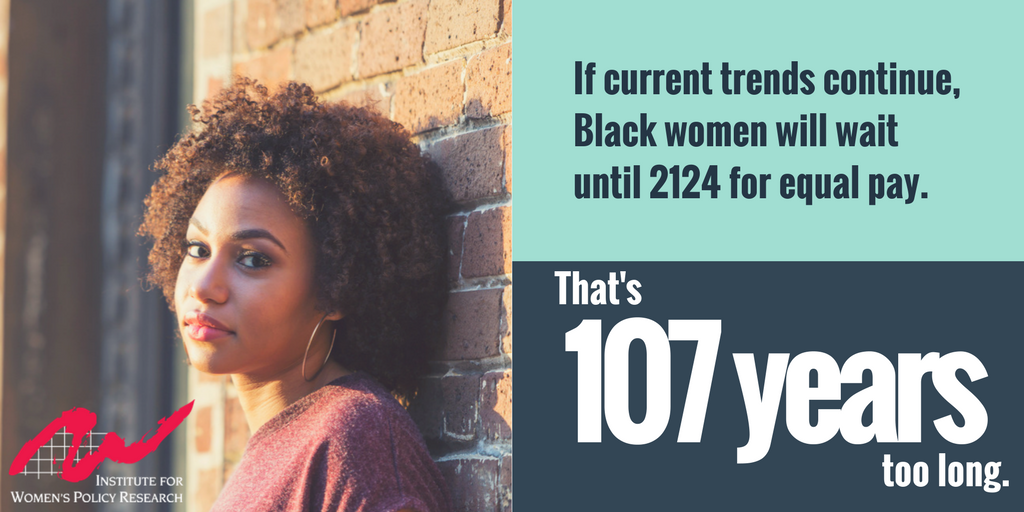5 Stats to Know on Black Women’s Equal Pay Day
Monday, July 31, is Black Women’s Equal Pay Day, marking how far into 2017 Black women must work to earn what White men earned in the previous year. A new report, The Status of Black Women in the United States, by the Institute for Women’s Policy Research (IWPR) in collaboration with the National Domestic Workers Alliance (NDWA) takes a comprehensive look at Black women’s status across six topic areas related to their political, health, and economic well-being.
The average Black woman working full-time earns only 63 cents for every dollar earned by a White man. This gap is wider than for women overall, who earn 80 cents for every dollar earned by a man. There isn’t one single reason for the gender wage gap: discrimination, the undervaluation of women’s work, occupational segregation, and the lack of work–family supports all contribute.
Here are 5 other stats to know on #BlackWomensEqualPay Day:
- At the current rate of progress, Black women will not see equal pay with White men until 2124.
If change continues at the same slow pace as it has for the past fifty years, it will take 42 years—or until 2059—for the median annual earnings of all women to finally reach pay parity with all men. Black women, however, would have to wait an extra 65 years on top of that, until 2124 to achieve equal pay with White men (Hispanic women will have to wait over two centuries, until 2248.)
- Black women have among the highest labor force participation rates for women.
Black women participate in the labor force at higher rates than White, Hispanic, Asian, and Native American women, with 62.2 percent of Black women in the workforce, Black women are the only group of women, among the large racial/ethnic groups included in the study, with a higher labor force participation rate than their male counterparts Almost four out of five (77.7 percent) Black mothers with young children participate in the workforce, higher than any other group of mothers.
- More than 8 in 10 Black mothers (80.6 percent) are breadwinners.
Black families depend on Black women’s earnings. Many Black women are raising families on their own, and more than half (50.6 percent) of Black mothers in married couples with young children are breadwinners—the largest share among women of any of the largest racial and ethnic groups.

- Between 2004 and 2014, Black women saw substantial declines in real wages, greater than for women from most other large racial/ethnic groups.
Black women’s real median annual earnings for full-time, year-round work declined by 5.0 percent between 2004 and 2014—more than three times as much as women’s earnings overall.

- Black women in unions earn 32 percent more than their nonunionized counterparts.
Black women workers working full time and represented by labor unions earn an average of $192.10, or 32.2 percent, more per week than Black women who are not in unions. Black women’s union wage advantage is greater than the union advantage among all women (31.3 percent). In the South, Black women in unions experience an even greater advantage than in the rest of the country, earning 34.5 percent more than their non-union counterparts.
Policy Recommendations
A number of policy interventions can help address low and declining wages Black women. First, raising the minimum wage and indexing it to inflation will increase the earnings and economic security of Black women working in low wage jobs. Raising the minimum wage could improve the earnings of breadwinner mothers, reduce poverty, and reduce gender and racial earnings inequality.
Second, the U.S. government should fully enforce Title VII of the Civil Rights Act of 1964, which made discrimination in hiring, pay, and promotions illegal, to improve Black women’s access to well-paid jobs.
Third, improving Black women’s access to good middle-skill occupations and providing equitable access to earn-while-you-learn apprenticeship opportunities will improve both Black women’s economic security and meet employers’ needs for a skilled workforce.
Stay Informed
Follow the discussion on social media with #BlackWomensEqualPay or visit blackwomensequalpayday.org. You can also follow IWPR on Instagram and Twitter at @IWPResearch, or follow us on Facebook for regular updates on our research. You can also sign up for our bi-weekly e-alerts to stay up to date on the latest releases.
About the author
- IWPR
- IWPR
- IWPR
- IWPR

